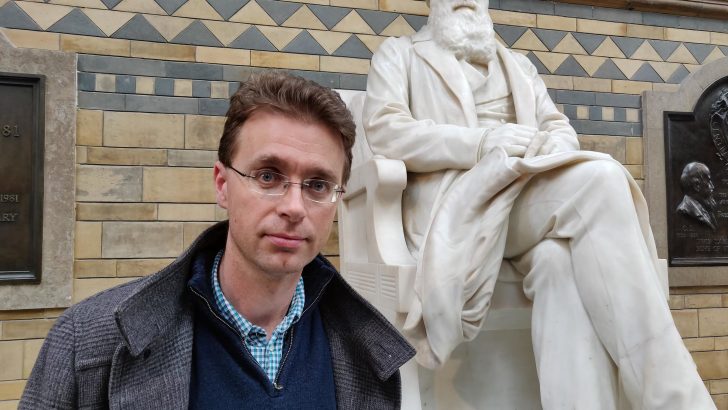A few weeks ago in this column I lamented the false dichotomy between science and religion – someone must have been paying attention!
Last Friday BBC Radio 4 launched a new series, The Secret History of Science and Religion, presented in an amiably cheerful fashion by Nick Spencer. It’s not exactly easy listening, and not easy to do justice to it in a short review.
Spencer is presenting a historical approach, and his thesis is that the idea of science and religion being always in conflict is a myth – he called it the “warfare narrative”. The real issue, according to Spencer, is not so much God, evolution, the age of the earth and such but has more to do with how we think of ourselves as human beings, more about “who owns the right to define what a human being is”.
Part of the reason for the warfare narrative is that, as one professor put it, “conflict sells”. Prof. Fern Elton Baker of the University of Birmingham found that this sense of conflict is a minority position among religious people, but is strong among atheists.
In his exploration of medieval times, wrongly thought of as an age of faith rather than science, Spencer showed a harmony between these pursuits with the Church being a kind of “massive research funding agency”, with the Church supportive of and responsible for the universities. “Hopeful theology” and “hard science” worked together and were not oppositional. He instanced the little known medieval bishop and scientist Robert Grosseteste. Spencer described how early scientists were theologically motivated, seeking to understand how God’s world works.
Originally, Galileo was encouraged by his friend Pope Urban but fell out of favour when he represented the Pope’s views as coming from a simpleton, and proposed his views too definitely rather than in an exploratory way. The row was more a dispute within religion and within science – as different views of the world vied. Spencer said people then didn’t see it as science vs religion – that polarisation would not become evident until 200 years later. I’m looking forward to the next episode.
Quirky stories
Sunday Morning Live is back on BBC1 and after two episodes I find it rather light. I’m not convinced of the value of the opening segment where quirky stories of the week are reviewed, usually by journalists or comedians. Some serious items get through, but last Sunday there was a part where the presenters and viewers showed pictures of their cute dogs!
On a more serious note, the discussion on whether society was too soft on criminals was interesting, though, with some nuanced difference, all seemed to agree broadly that while deterrent was needed, there should be serious efforts at rehabilitation during the time people spent in prison in order to reduce the risk of re-offending.
Later, the show featured the new Vatican document exploring the idea of ordaining married men to cope with the shortage of priests in the Amazon area. Journalist and author Joanna Moorhead was supportive of the idea, pointing to Eastern Rite churches and those married former Anglican priests who had become Catholic priests. She described the Catholic Church as ‘an organisation where there’s lots of change’.
Perhaps ironically, one of those married priests, former Anglican Fr Simon Chinery, urged caution – there were advantages and problems – with married priests, he said, the normal stresses of family life were on the public stage.
Moorhead thought the Church should look at the possibility of women priests and that the faith was what was most important, but Fr Chinery said this was not possible, was not a matter of choice for the Church and was part of that important faith.
Finally, it was good to hear Francis Campbell, former British ambassador to the Holy See, delivering Thought for the Day last Monday morning on BBC Radio 4. On the occasion of the recent feast day of St Thomas Moore, he had some thoughts on politicians. He wasn’t a fan of those who were all motion and no direction. He wanted to see leaders of breadth, depth and principle.
With all the shenanigans in the UK over the Conservative Party leadership contest, it was a timely piece. Unfortunately, it can happen that politicians of principle get booted out of their political parties.
We can see politicians that we thought had principles taken on mysterious ‘journeys’, returning with a different set of principles, or none at all.
Pick of the Week
SUNDAY
BBC Radio 4, Sunday, June 30, 7.10 am
Sunday morning religious news and current affairs programme presented by William Crawley.
MARRIAGE WORKS IN CHRIST
EWTN, Sunday, June 30, 3.30 pm
Frequently asked questions about marriage: Greg and Julie Alexander, along with Fr James Dean, continue their series on overcoming marital adversities.
THE SECRET HISTORY OF SCIENCE AND RELIGION
BBC Radio 4, Friday, July 5, 11 am
Nick Spencer examines the history of science and religion and questions the extent to which they have been in conflict with one another.


 Brendan O’Regan
Brendan O’Regan Nick Spencer presents The Secret History of Science and
Religion ((BBC Radio 4).
Nick Spencer presents The Secret History of Science and
Religion ((BBC Radio 4). 